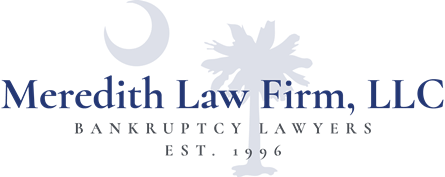What Is Chapter 13 Bankruptcy?
Approximately 500,000 people in the United States declare bankruptcy each year, highlighting how common this legal process is. In its simplest definition, bankruptcy is initiated when a person or business cannot repay outstanding debts or obligations.
There are a number of different types of bankruptcy, including Chapter 7 (which is the most common type), Chapter 11, and Chapter 13. The latter serves as an alternative to Chapter 7 and will be the focus of this blog post.
Here, your expert team at Meredith Law Firm, LLC will highlight everything you need to know about Chapter 13 bankruptcy. This will include why people file for this chapter of bankruptcy, how it works, who is eligible, understanding who can afford this option, and what happens in the event that a person is unable to pay. Let’s get started.
Why Do People File for Chapter 13 Bankruptcy
In exchange for debt relief, a person who files for Chapter 13 bankruptcy pays their discretionary income to creditors through a 3- to 5-year repayment plan.
As we have mentioned, Chapter 7 is the most common type of bankruptcy, which sees people wipe out debt in a shorter amount of time without repaying creditors. However, not everyone qualifies for this option and many people turn to Chapter 13 bankruptcy as they have significant income or are keen to retain their valuable property.
Often, people choose this option as they earn too much money to pass the means test for Chapter 7 bankruptcy. As noted, they also may not wish to lose a house or a car after falling behind on repayments.
How Does Chapter 13 Bankruptcy Work?
There are a number of steps involved in the Chapter 13 bankruptcy process, from beginning to end. Let’s take a closer look at each of these in turn.
1. Complete Credit Counseling Course
In the 180 days before filing for Chapter 13 bankruptcy, a person is mandated to complete a credit counseling course. This must be through an agency that has been approved by the Department of Justice U.S. Trustee Program. The objective of this course is to evaluate if a person has sufficient income to repay their creditors.
2. File the Paperwork for Chapter 13 Bankruptcy
This is the step that starts a person’s bankruptcy case. Once this has been done, a court clerk will send a letter notifying the person, their creditors, and the trustee appointed to the case of the automatic stay prohibiting collection activities.
Other information included in this letter includes creditor deadlines as well as the date of the 341 meeting of creditors (more on that below). When filing your credit counseling certificate and bankruptcy paperwork, there is a bankruptcy filing fee that must be paid.
3. Attend the 341 meeting of creditors
In advance of this meeting, the individual will hand over their 521 documents. These will include paycheck stubs, tax returns, and bank statements and is presented to the trustee.
This meeting is where the bankruptcy trustee and potentially any interested creditors can ask the person questions about their financial affairs and bankruptcy papers. This is done while the person is under oath. It is the job of the trustee to ensure that the person is not lying on their bankruptcy petition or abusing the bankruptcy system.
4. Start Paying the Chapter 13 Bankruptcy Plan Payment
The month after a person files, the Chapter 13 payments will begin. This is the case even though a court won’t have confirmed the proposed Chapter 13 plan. It is don’t so as to help ensure that the case ends on schedule (typically in 5 years).
If the plan is not confirmed by the court, the person will be refunded their payments by the trustee (except in the case of car payments).
5. Complete the Confirmation Process
Both the bankruptcy trustee and the person’s creditors will be given an opportunity to object to the proposed repayment plan. In the case that this happens, the person’s attorney will generally work to make changes that are to everyone’s satisfaction.
The judge in the case must then answer a number of questions affirmatively before confirming the person’s plan, such as whether or not the plan is feasible.
6. Complete the Confirmed Plan
The final steps are to complete all payments and complete a second course (known as the debtor’s education course). The person must also be current on both alimony obligations and child support, if applicable.
After a bankruptcy discharge, most filers are free of debt except for student loans and mortgages.
Who Is Eligible for Chapter 13 Bankruptcy?
There are a number of criteria that a person must pass to be eligible for this type of bankruptcy. For example, a person can have only so much debt and there are debt limitations for Chapter 13. In these cases, a person can file an individual Chapter 11 bankruptcy.
There are also income requirements. It is necessary that the person proves they can afford to pay both their monthly plan payment and their monthly household obligations.
In cases where a person is unable to pay their plan payment (such as if their income decreases), there are a number of options available. These include modifying the payment, asking for a hardship discharge, switching to a Chapter 7 bankruptcy, or missing the case altogether.
Understanding What Is Chapter 13 Bankruptcy
If you are interested in learning more about Chapter 13 bankruptcy, your premier choice in Charleston, Columbia, and Myrtle Beach, SC, is Meredith Law Firm, LLC.
Contact us today to schedule a free consultation and begin the recovery process. We are available to have appointments in person, telephonically, or by video conference.
